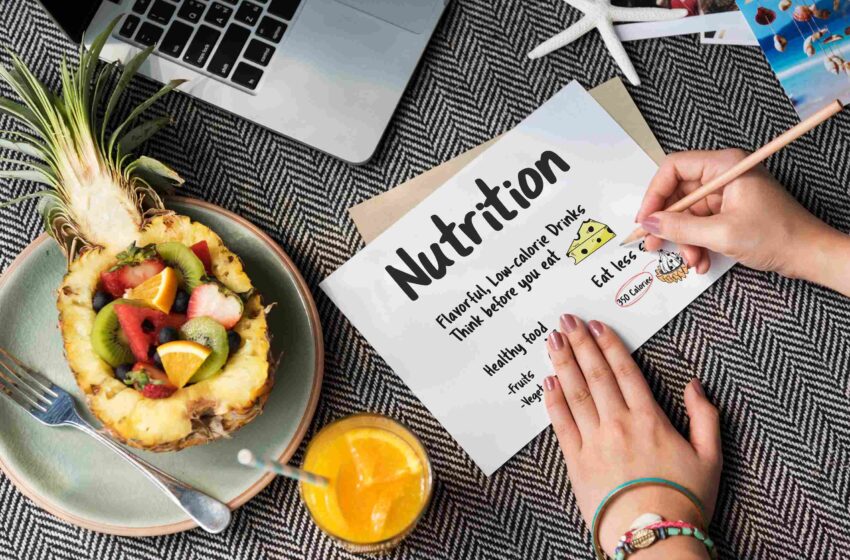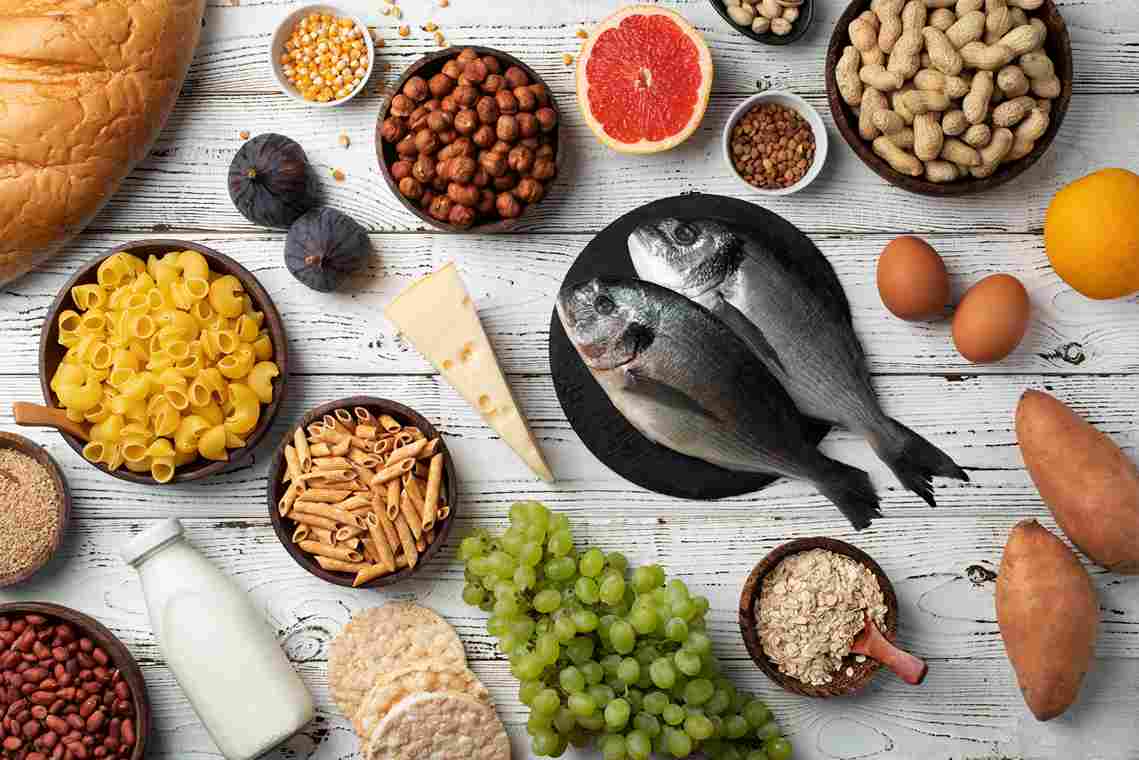
Essential Tips For A Healthier You: The Ultimate Nutrition Guide
Prioritizing health and nutrition in today’s world has become more crucial than ever before. Browsing for healthy diet recipes, your eyes deliberately skimming through the restaurant’s menu card to land on a nutritious dish, downloading several health and fitness apps, consciously weighing your weight probably with your one closed while the other peeking at the double digits, following different patterns of diet just to understand what your body needs, the tiny containers of supplements that read “100% organic” sitting sincerely on your bedside table, and many such habits tell us how everyone is struggling with their quest to maintain optimal health and nutrition.
Table of Contents
ToggleWe Get You!
With the rise in health problems, prioritizing your health and nutrition is very important, but no one talks about how complex and daunting these transformation journeys can be! We understand how painful it is to navigate through a path of diverse health plan options, overflooded dietary information, generational myths, and an ever-expanding encyclopedia of scientific findings just to achieve that vision of “healthier you” that you daydream of. But don’t worry, just like Chai got toast, you got us! We are here to simplify things for you.
In this blog on health and fitness, we shall provide you with a comprehensive guide that contains all the essential nutrition tips for a healthier and prettier you.
Let’s Start With The Basics
When we talk about health, nutrition becomes synonymous with it, and that is because the former is determined by the intake of the latter. To put it simply, if your body is a car, then health is the engine and nutrition is the fuel. Now if the fuel is not adequate or of low quality, then it will affect the functioning of the engine, which in turn will lower the efficiency of the car. The fuel (nutrition in this case) is made up of several key components, each with distinctive properties that are essential to keep the engine running smoothly. Got the point?
Basically, nutrition is the process by which the body utilizes food and gives energy to the body, which the latter uses to maintain health and overall well-being. Now that you understand what nutrition is, let’s learn about the key components of nutrition.
The Building Blocks: Macronutrients

Macronutrients, as the name suggests, are nutrients that are needed by our body in large amounts. They are the building blocks of our body and help in the building and repairing of our body. Micronutrients consist of:
Carbohydrates
The moment we hear “carbohydrates” or “carbs,” we tend to run in the opposite direction. Almost all of us relate carbs to potatoes and pasta, but we need to understand it’s beyond that. Carbohydrates are the body’s primary source of energy.
Though many health regimes focus on cutting off carbs completely, the key is to find the right carbs and not completely break up with them. Carbohydrates have two forms: simple and complex. But how would you know which is your friend (good carbs) and which is foe (bad carbs)? Since you can’t always tell from the nutrition label if an item contains simple or complex carbohydrates, here’s a list of both to help you pick the right carbs for you.
Simple Carbs
Simple carbs, also called sugars, facilitate fast digestion. The sooner it gets digested, the sooner it is released into the bloodstream and increases the blood sugar level instantly. So if you need an instant spike in energy, then go for simple sugars. But not all sugars are your friend. Here’s a list of sugars that are okay to consume and which are not.
Friends-
- Organic fruits
- Natural sweeteners like honey, dates, maple syrup, etc.
- Milk and milk products
Foe-
- Sugary soda
- Baked goods containing added sugars
- Refined sugars like brown sugar, white sugar, high-fructose corn syrup, etc.
- Packaged sweets
- Packaged fruit juices with less than “100% fruit juice” content
Complex Carbs
Complex carbs are preferred over simple carbs. It’s said, “The more complex the carb, the better.” Complex carbs consist of fiber and starch. The body digests them slowly, as a result of which glucose is released gradually into the bloodstream, causing no blood sugar spike. They are stored forms of energy, which the body uses from time to time as per requirement. They are great for weight-control regimes as they fill your stomach in small servings.
Fibers are great for your gut health and the maintenance of cholesterol levels. Some dietary fibers that you should include in your diet are:
- Fruits
- Vegetables
- Nuts
- Beans
- Whole grains
Starch, on the other hand, is found in equal or greater amounts in the same food as fibers. Some foods rich in starch are:
- Oats
- Cereal
- Corn
- Whole wheat bread
- Rice
- Peas
Eating complex carbs has been shown to provide more health benefits than simple carbs. The former not only helps to maintain a healthy weight but has also proven to be a great preventive nutrient against type 2 diabetes and cardiovascular problems.
Proteins
Proteins are the best friends of every gym and health enthusiast. The moment we hear of proteins, a lean and muscular physique surfaces in front of our eyes. They are body-building foods. Proteins are made of small building molecules called amino acids. There are a total of 20 amino acids, out of which 9 are essential for our body, but we can’t produce them, so we need to provide them through diet.
In addition to muscle growth and nutritional value, proteins perform a number of other functions, like:
- Repair of worn-out tissues
- Facilitates immune function
- Synthesis of hormones
- Involved in many chemical reactions of the body.
Foods Rich In Protein
Here are some foods which are rich in proteins and provide great nutritional value:
- Eggs (both whole and just egg white)
- Almonds
- Chicken breast
- Lentils
- Dairy products like milk, cottage cheese and Greek yogurt
Fats
Are you too one of those people who gets scared as soon as you hear this four-letter word? Well, we understand most individuals are paranoid about fats. But cutting fats down completely is not a solution, as they too are an essential macronutrient required by our body. Why? Because
- Fats are a source of essential fatty acids like Omega-3 and Omega-6, which our body can’t produce itself.
- They help our body to absorb fat-soluble vitamins like vitamins A, D, and E.
- Act as insulators to our organs and keep our body warm.
Hence, it’s necessary to add fats in proportion to your balanced diet. But are all fats good?
Good Fats And Bad Fats
Intake of good or healthy fats has been shown to reduce the risk of heart problems and cholesterol problems. However, if fat is taken in excess, then our body turns this excess fat into body fat, which over time gets deposited in various parts of your body, such as the waist, belly, chin, thighs, etc., and can lead to a number of health problems like obesity, diabetes, heart problems, lack of energy and concentration, joint pain, and immobility issues. So if you are keen on prioritizing health and nutrition, then adding healthy fats to your diet is important.
Healthy Fats: Trans fats and unsaturated fats like monounsaturated and polyunsaturated fats are considered to be “healthy.”
Unsaturated Fats
Make unsaturated fats, which include mono- and polyunsaturated fats, your allies if you want to keep your cholesterol levels in check. High levels of “bad” cholesterol (LDL) are a major factor in heart diseases, skin problems, and diabetes. To keep your cholesterol in control, it’s best to switch to a diet that contains all the necessary unsaturated fats. These fats lower the concentration of LDL and promote the uptake of HDL (“good” cholesterol) in the body.
These are some food items that are rich in unsaturated fats.
- Omega-6 rich foods such as flaxseed, rapeseed oil, sunflower oil, walnut, almond, cashew
- Omega-3-rich oily fish such as trout, salmon, kippers, sardines, mackerel
- Olive oil, avocado, Brazil nuts, peanuts
Trans Fats
The more trans the fat is, the better. Trans fats are another essential form of healthy fats. Food items like meat and dairy products naturally contain low levels of trans fat.
Unhealthy Fats: These are the fats you need to keep a safe distance from. They are mainly saturated fats.
Saturated fats
Imagine an enemy is residing in your body (LDL—bad cholesterol), and that enemy has a friend (saturated fats), which promotes their evil activities, causing harm to your body in the long run. Would you like to foster that enemy friend inside your body? No, right. As delicious as the confectioneries and savory foods may taste, they are home to the biggest enemy of your health, which is saturated fats.
Saturated fats raise the amount of cholesterol levels in your body. Now, what is this cholesterol?
Cholesterols are fatty acids generated in the liver and carried in our bloodstream as
- Low-density lipoprotein (LDL), and
- High-density lipoprotein (HDL)
LDLs are considered to be “bad,” whereas HDLs are considered to be “good,” as the latter is involved in transporting excess cholesterol from the body parts to the liver for disposal. Consuming foods rich in saturated fats (they being the friends of your enemy) spikes the LDL levels in your blood. These raised levels can result in serious health issues like
- Stroke
- Heart attack
- Excess weight or obesity
- Vascular dementia
Therefore, cutting down on foods that are rich in saturated fats and switching to trans and unsaturated fats can significantly reduce your risk of health diseases and also help you maintain an optimal weight.
Here’s a list of a few food items containing high levels of unhealthy fats. –
- Meat items, including fat, sausages and pies
- Butter and ghee
- Cheddar cheese
- Sour creams and ice cream
- Savory snacks like cheese popcorn and crackers
- Chocolates and confectionery like cakes, biscuits, and pastries
- Coconut oil
The Small But Mighty: Micronutrients
Micronutrients are required in small amounts but play a vital role in our body. Micronutrients are mainly disease-fighting nutrients and are composed of minerals and vitamins. They are found in abundance in green vegetables and fruits.
- Vitamins are organic chemicals that must be supplied to the body in small amounts to maintain health. Vitamins facilitate the metabolism of proteins, carbohydrates, and fats. The vitamins are divided into two major groups— fat-soluble vitamins (vitamins A, D, E and K) and water-soluble vitamins (vitamin B complex and C). Each type of vitamin performs a specific function like vitamin C acts as an antioxidant and is important for immune system health while vitamin D is needed for proper absorption of calcium and increases bone strength.
- Minerals are needed only in small amounts and have many different functions. Some minerals assist in the body’s chemical reaction and others help to form body structure. For instance, calcium helps build strong, healthy teeth and bones; iron is important for the transportation of oxygen throughout the body, and iodine is crucial for regulating growth, development and metabolic rate.
Hydrate! Hydrate! Hydrate: Water
Talking about prioritizing our health and nutrition and forgetting to talk about water would be a sin. As trivial as water may appear, it is one of the most crucial components of our body and diet. Being a 60% constituent of our body, water is essential for almost every function of our body from delivering nourishment to controlling temperature. Besides, drinking enough water helps with detoxification, joint lubrication, and digestion.
We Are What We Eat
Nutrition is therefore a key factor in changing your health game. Every nutrient is important for our body, and eating everything in proportion (also called a balanced diet) can have a profound impact on our health. A balanced diet with high nutritional value has been shown to significantly reduce the risk of chronic diseases like heart disease, high blood pressure, digestive problems like constipation, and mental health issues like depression and anxiety. In addition, it also supports weight management and promotes overall well-being.
Steps You Can Take For A Healthier You
With the evolution of the internet, there are a plethora of tips available to transform your health and lifestyle. But listening to your body’s needs, balancing your diet, and being consistent with a healthy routine are the keys to achieving a healthier lifestyle.
Having said that here are some easy steps you can take to achieve a healthier version of yourself:
- Choose a specific dietary pattern that suits your bodily requirements. Many trending diets fulfill specific nutrition needs and are very easy to follow, such as the plant-based diet, the keto diet, the Mediterranean diet, and intermittent fasting.
- It’s very important that you know what you are consuming. Learning to read nutrition labels and understanding them to make informed choices can have significant effects on your health. Always check the ingredient list on the back of the food products and evaluate the proportions of healthy and essential nutrients to the unhealthy ones. Go for items that contain fewer added sugars or other additives and more dietary fibers and essential nutrients.
- Adding supplements to your diet is a great way to balance your health regime. Though we try to intake all the necessary nutrients via our food, we can still fall short of providing our body with the right amount of nutrients it actually requires. Supplements that are commonly used include multivitamins, omega-3 fatty acids, and probiotics.
- Keeping your body and mind in sync is very crucial to maintaining optimal health. Nutrition alone won’t do the job. Inculcating good habits in your lifestyle like regular exercise, adequate sleep, meditation and yoga, and controlling stress levels contribute greatly to a healthier you.
It’s important to follow all the essential tips regarding prioritizing health and nutrition to maintain a healthy lifestyle, but one thing you should remember is that everyone’s body is different, and so is the health journey. Accomplishing a healthier version of yourself should be more of a holistic approach rather than a scientific method. So, take one step at a time, understand the intricacies of nutrition, make informed food choices, and embrace your transformation journey instead of getting frustrated by it. Remember, your body is your palace, and how you treat it will determine the upcoming years of your life. So, fall in love with the process and nurture yourself.
Disclaimer: This blog is written from purely an educational and informational perspective and does not intend to convey as a substitute for any kind of professional medical advice. The content of this blog is a reflection of the author’s opinions and should not be considered as medical instruction. If you have any medical concerns relating to the content, then kindly seek professional healthcare assistance. You thereby bear all liability for any reliance you may have on such material, and the author is not held accountable for any loss or damage that may arise from using this blog.

